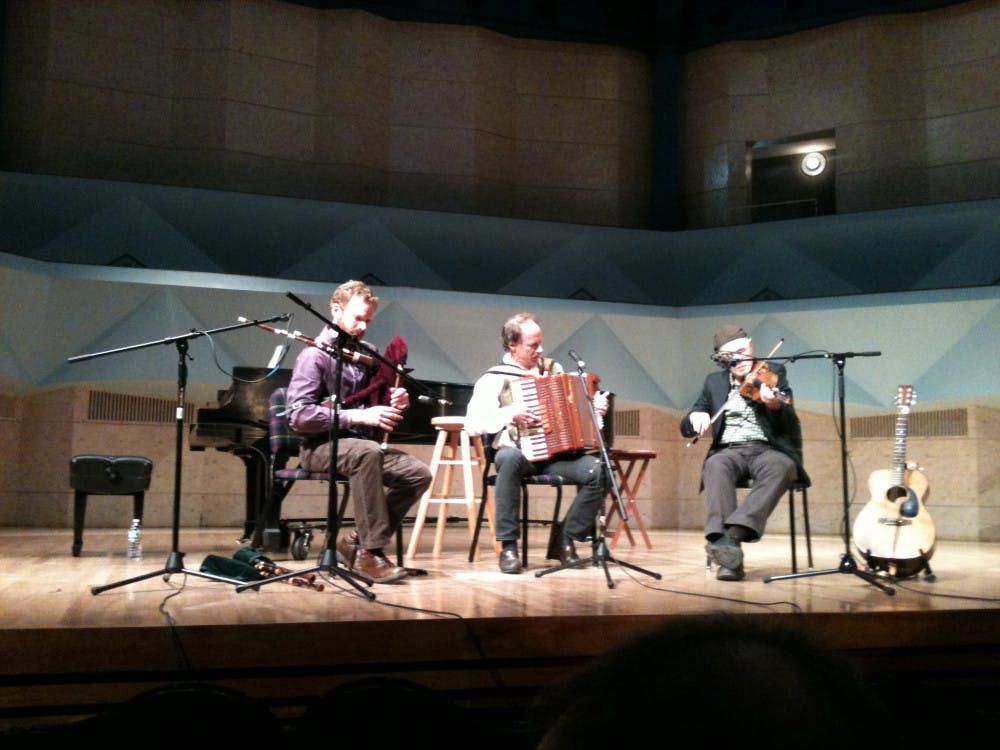The cheerful, vivacious Alexander Twilight Artist-in-Residence Francois Clemmons — decked out in Irish green tamed by his sparkling kaleidoscopic blazer — came out on stage toting a gold purse, pulling out all the stops as he opened the curtains for his last and 10th annual St. Patrick’s Day Concert.
Crowned in a gold tiara, Clemmons announced his plans to retire after this semester to a crowd of students, faculty and loyal Vermonters who have come from near and far every year to the concert.
“I came to Middlebury because I love the students and the intense, wonderful, stimulating experience of talking to the students,” Clemmons reassured the audience, tears welling up.
“When I tell you I love you, I can’t pretend. I care about the Fridays and Saturdays, the liquor and sex — the process of growing up. I simply say, ‘You’re alright just the way you are.’ The students are an important part of why I sing.”
On Sunday evening in the Kevin P. Mahaney ’84 Center for the Arts, the concert presented every instrument from skirling highland bagpipes, penny whistles, pleated accordions and stringing harps. Guest artists included Affiliate Artist Timothy Cummings, Director of Jazz Activities Dick Forman, local artists Margie Bekoff, Jeremiah McLane and Pete Sutherland.
The guest artists frontloaded so much tradition and excitement for instruments new to the audience that it was entrancing.
First, Clemmons sang “Lough Erin Shore,” a song with the sad theme of farewell to the mountains of Ireland that Clemmons uses to impart his farewell to the rolling hills of Middlebury College.
Student Ben Harris ’16, alum Andy Collin ’12, and Cummings followed with “Amazing Grace” on the highland bagpipes, a familiar song Clemmons described as the “perfect of the infusion of Irish music and the music of Black people” — a song many suggest to have Irish origins. With bagpipes strapped around their kilts, the three bagpipers illuminated the room with Celtic spirit, their feet-stomping reverberating across the floor so loud that you couldn’t help but tap your shoes matching every beat.
Bekoff’s harp solo took the audience to sweet-sad melodies as audience members closed their eyes and allowed themselves to drift off into air of traditional Irish, Scottish and Welsh songs.
Cummings on the penny whistle then rejoined the stage with Sutherland on fiddle and McLane on piano and accordion, playing a set of traditional dance tunes that drew from various outlets from Ireland to Brittany in France. While the concert hall stadium didn’t give you much room to dance, it made your hearing focus on the vivacious songs and react by wiggling in your seat.
These traditional dance tunes triggered a sudden dynamic shift from sad melodies to a lively celebration that led up to the climactic sing-along.
With lyrics at hand, the audience and Clemmons mashed together on choruses of Irish classics like “Peg of My Heart,” “My Wilde Irish Rose” and “When Irish Eyes are Smiling,” creating a huge, charismatic crescendo to the concert.
The gradual shift from sadness and seriousness to fun and celebration hammered home variations of one, single theme: through the thick and thin, preserve your spirit and identity — both personally and culturally.
Clemmons managed to strike a balance between the two parts of the concert by bringing light and humor to serious issues.
He opened the concert with heavy subjects, discussing the two teenagers founded guilty of rape in Ohio, the Catholic church, rape and sexuality in the military, theology and spirituality.
“I’ve been mindful of today’s issues: state, national, world issues, global warming,” Clemmons reflected. “I like the warm, but I don’t want to be burnt to a crisp.”
His last concert was a reminder of human spirit and survival. Clemmons paid tribute to those with hearts strong enough to fight for what they believe is right and deserved.
“There has been a lot of war and the Irish write beautifully about it,” he said. “I’d like to dedicate this song [“Foggy Dew”] to these warriors. I do not care for violence and I am the unlikeliest of warriors, but if we didn’t have warriors like Martin Luther King, Jr. and Gandhi, we would not have civil rights. Never think the job is complete or finished — it’s not.”
As Curtains Draw, Clemmons Bows Out with a Bang

Comments



